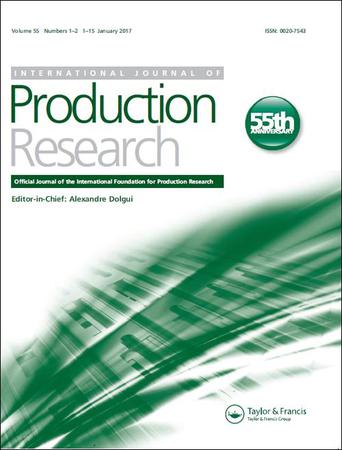Valid inequalities for the non-unit demand capacitated minimum spanning tree problem with arc time windows and flow costs
IF 7
2区 工程技术
Q1 ENGINEERING, INDUSTRIAL
International Journal of Production Research
Pub Date : 2023-11-05
DOI:10.1080/00207543.2023.2276818
引用次数: 0
Abstract
AbstractIn this paper, we introduce the non-unit demand capacitated minimum spanning tree problem with arc time windows and flow costs. The problem is a variant of the capacitated minimum spanning tree problem with arc time windows (CMSTP_ATW). We devise a mixed integer programming (MIP) formulation to model the problem and solve it using CPLEX. Furthermore, we propose three sets of inequalities, and we prove that they are valid. These valid inequalities tighten the model and lead to better lower bounds. To examine the quality of the solutions obtained, we convert the original data sets of Solomon (Citation1987, “Algorithms for the Vehicle Routing and Scheduling Problem with Time Window Constraints.” Operations Research 35 (2): 254–265. https://doi.org/10.1287/opre.35.2.254) to approximate the non-unit demand CMSTP_ATW instances and provide results for the problems with 100 nodes. We execute extensive computational experiments, and the results show the positive effect of the inclusion of valid inequalities in the MIP.KEYWORDS: Capacitated minimum spanning treearc time windowsmixed integer programming formulationvalid inequalitiesflow costs AcknowledgementsThe authors would like to thank the anonymous reviewers, the Associate Editor and the Special Issue Editor for their acute comments and constructive suggestions that helped improve the content and the presentation of the manuscript.Disclosure statementNo potential conflict of interest was reported by the author(s).Data availability statementThe data that support the findings of this study are available from the corresponding author, [M.N.K.], upon request.Additional informationNotes on contributorsManolis N. KritikosManolis Kritikos is Professor of Operations Research and Information Systems at the Department of Management Science and Technology, Athens University of Economics and Business (AUEB). He obtained his Ph.D. in Management Science from AUEB and his MSc in Operations Research and Information Systems and BSc in Mathematics, both from the University of Athens. His doctoral research has been funded by the EDAMBA (European Doctoral Programme Association in Management and Business Administration) programme, with host institute the Rotterdam Business School. He is serving as Director of the Management Science Laboratory (MSL) of AUEB. His research interests include combinatorial optimisation, mathematical programming models, design and analysis of algorithms for operational research problems and performance measurement. In recent years, he published papers on top-ranked journal including OMEGA, Expert Systems with Applications, the International Journal of Production Economics, Journal of the Operational Research Society, International Transactions in Operational Research, Socio-Economic Planning Sciences, Applied economics, and Operational Research. He is associate editor of the Journal of Statistics and Management Systems. He was awarded the Certificate of Outstanding Contribution in Reviewing by the ELSEVIER for his contribution to the quality of the ESWA Journal. He has served as a consultant on Information Systems at the Greek Ministry of Development. From 2015 to 2021, Manolis Kritikos was Secretary General of Mathematical Society of SouthEastern Europe (MASSEE).George IoannouDr. George Ioannou is Professor of Operations Management at the Department of Management Science and Technology of the Athens University of Economics and Business (AUEB). He was the Chief Executive Officer of the Hellenic Energy Exchange Group (2019–2022), a Senior Manager at Deloitte Consulting and the Director of the Management Science Laboratory of AUEB (2012–2019). He has served as Director of the International MBA Programme of AUEB and Assistant Professor at the Department of Industrial and Systems Engineering of Virginia Tech. He received his diploma in Mechanical Engineering from the National Technical University of Athens, and his M.Sc./DIC in Robotics and Automation from Imperial College, UK. He was a GRA at the Institute for Systems Research (University of Maryland, USA) where he received his Ph.D. in Mechanical Engineering. He is the recipient of the Microsoft Excellence in Education Award and the outstanding achievement award of the Hellenic Association of Energy Economics, and has been honoured with many Excellence Awards for his MBA courses and innovative developments. He was a member of the Board of Directors of Hellenic Railroads SA, of the Innovation Council at the Ministry of Development, of AUEB’s Senate and of AmCham’s Innovation Committee, and has served as Head of the Evaluation Committee of ΣΥΖΕΥΞΙΣ ΙΙ (Information Society SA).具有弧时间窗和流量成本的非单位需求最小生成树问题的有效不等式
摘要本文讨论了具有弧时间窗和流成本的非单位需求最小生成树问题。该问题是带弧时间窗的有能力最小生成树问题(CMSTP_ATW)的变体。我们设计了一个混合整数规划(MIP)公式来对问题进行建模,并使用CPLEX进行求解。进一步,我们提出了三组不等式,并证明了它们的有效性。这些有效的不等式加强了模型,并导致更好的下界。为了检验得到的解的质量,我们转换了Solomon (Citation1987)的原始数据集,“带时间窗口约束的车辆路线和调度问题的算法”。运筹学研究35(2):254-265。https://doi.org/10.1287/opre.35.2.254)来近似非单元需求CMSTP_ATW实例,并提供具有100个节点的问题的结果。我们进行了大量的计算实验,结果显示了在MIP中包含有效不等式的积极效果。关键词:有能力最小生成树时间窗口混合整数规划公式有效不等式流动成本致谢作者要感谢匿名审稿人、副主编和特刊编辑的意见和建设性建议,这些意见和建议有助于改进稿件的内容和呈现。披露声明作者未报告潜在的利益冲突。数据可用性声明支持本研究结果的数据可从通讯作者[M.N.K.],应要求。作者简介:manolis N. Kritikos,雅典经济与商业大学管理科学与技术系运筹学与信息系统教授。他获得了AUEB管理科学博士学位,以及雅典大学运筹学和信息系统理学硕士学位和数学学士学位。他的博士研究得到了EDAMBA(欧洲管理和工商管理博士课程协会)项目的资助,主办机构是鹿特丹商学院。现任管理科学实验室(MSL)主任。他的研究兴趣包括组合优化、数学规划模型、运筹学问题算法的设计和分析以及性能测量。近年来在《OMEGA》、《Expert Systems with Applications》、《International journal of Production Economics》、《运筹学学会学报》、《运筹学国际汇刊》、《社会经济计划科学》、《应用经济学》、《运筹学》等顶级期刊上发表论文。他是统计与管理系统杂志的副主编。他被ELSEVIER授予杰出评审贡献奖,以表彰他对ESWA期刊质量的贡献。他曾担任希腊发展部信息系统顾问。2015年至2021年,Manolis Kritikos担任东南欧数学学会(MASSEE)秘书长。乔治IoannouDr。乔治·约安努是雅典经济与商业大学管理科学与技术系运营管理学教授。他曾担任Hellenic Energy Exchange Group的首席执行官(2019-2022),德勤咨询公司的高级经理和AUEB管理科学实验室的主任(2012-2019)。他曾担任AUEB国际MBA项目主任和弗吉尼亚理工大学工业和系统工程系助理教授。他在雅典国立技术大学获得机械工程文凭,并在英国帝国理工学院获得机器人和自动化硕士学位。他是马里兰大学系统研究所(Institute for Systems Research, University of Maryland, USA)的GRA,并在那里获得机械工程博士学位。他是微软卓越教育奖和希腊能源经济协会杰出成就奖的获得者,并因其MBA课程和创新发展而获得多项卓越奖。他是Hellenic railways SA的董事会成员,发展部创新委员会成员,AUEB参议院成员和美国商会创新委员会成员,并曾担任ΣΥΖΕΥΞΙΣ ΙΙ (Information Society SA)评估委员会主任。
本文章由计算机程序翻译,如有差异,请以英文原文为准。
求助全文
约1分钟内获得全文
求助全文
来源期刊

International Journal of Production Research
管理科学-工程:工业
CiteScore
19.20
自引率
14.10%
发文量
318
审稿时长
6.3 months
期刊介绍:
The International Journal of Production Research (IJPR), published since 1961, is a well-established, highly successful and leading journal reporting manufacturing, production and operations management research.
IJPR is published 24 times a year and includes papers on innovation management, design of products, manufacturing processes, production and logistics systems. Production economics, the essential behaviour of production resources and systems as well as the complex decision problems that arise in design, management and control of production and logistics systems are considered.
IJPR is a journal for researchers and professors in mechanical engineering, industrial and systems engineering, operations research and management science, and business. It is also an informative reference for industrial managers looking to improve the efficiency and effectiveness of their production systems.
 求助内容:
求助内容: 应助结果提醒方式:
应助结果提醒方式:


